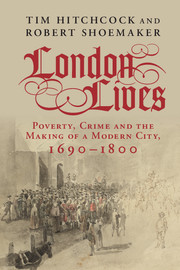Book contents
- Frontmatter
- Dedication
- Contents
- List of figures
- Preface
- Acknowledgements
- List of abbreviations
- 1 Introduction
- 2 Beggarman, thief: 1690–1713
- 3 Protest and resistance: 1713–1731
- 4 Vestries, justices and their opponents: 1731–1748
- 5 Reformers and their discontents: 1748–1763
- 6 Finding a voice: 1763–1776
- 7 The state in chaos: 1776–1789
- 8 Epilogue: The 1790s
- Bibliography
- Index
- References
1 - Introduction
Published online by Cambridge University Press: 05 December 2015
- Frontmatter
- Dedication
- Contents
- List of figures
- Preface
- Acknowledgements
- List of abbreviations
- 1 Introduction
- 2 Beggarman, thief: 1690–1713
- 3 Protest and resistance: 1713–1731
- 4 Vestries, justices and their opponents: 1731–1748
- 5 Reformers and their discontents: 1748–1763
- 6 Finding a voice: 1763–1776
- 7 The state in chaos: 1776–1789
- 8 Epilogue: The 1790s
- Bibliography
- Index
- References
Summary
Thomas Limpus
Thomas Limpus was born into modest circumstances on 23 July 1760, to parents who frequently relied on the parish to make ends meet. He shared his fourteenth Christmas with a rag-tag collection of twenty-five boys and men from eight years old to eighty in a mixed men’s ward at St Martin in the Fields workhouse. For those few weeks he was a member of the ‘workhouse family’ and celebrated the most important ritual of the year with its members. But this was only the first of the many temporary and artificial communities he was obliged to join as a result of his encounters with the institutions of poor relief and justice over the next twenty-five years. In 1777, at seventeen years old, he stole a handkerchief and was sentenced to three years hard labour on the hulks; he was also forced to share his food, labour and life with a newly formed group of long-term prisoners.
Within months of his release, now aged twenty, he was once again caught stealing a handkerchief and was held for three months in Tothill Fields Bridewell with a constantly changing population of disorderly vagrants and prostitutes noted for spending their days gambling and retailing dirty jokes. And following an appearance before the Westminster sessions charged with ‘Petit Larceny’, he spent most of the next year in New Prison. In each institution he was forced to engage with a new group of people and new figures of authority, and to develop along with his fellow prisoners strategies for survival in that temporary home. At the same time, and along with his many contemporaries, his recidivism and later direct challenges to the working of those institutions helped to illustrate the failure of the prisons and hulks to eradicate the problems of crime and disorder.
- Type
- Chapter
- Information
- London LivesPoverty, Crime and the Making of a Modern City, 1690–1800, pp. 1 - 26Publisher: Cambridge University PressPrint publication year: 2015



